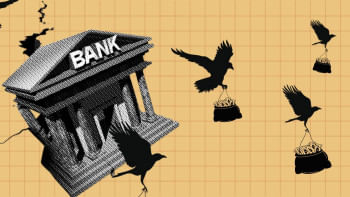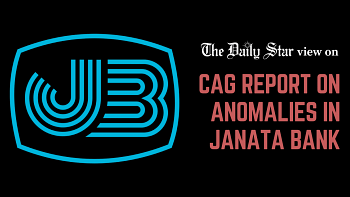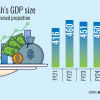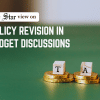No excuse for rising loan defaults

In recent years, non-performing loans (NPLs), or defaulted loans, have been one of the factors crippling our banking sector. On a number of occasions, economists have spelled out the core reasons behind this growing menace and suggested targeted measures to stem its growth. Unfortunately, those suggestions have fallen on deaf ears, as we have not seen any solid efforts from the authorities to prevent wilful loan-defaulting.
The consequence is this: as of June 2023, the amount of NPLs stands at a staggering Tk 156,039 crore – a record high in the country's history, according to Bangladesh Bank. This is without counting written-off loans and loans stuck in the money loans court; had those been included in the official figure, the amount of bad loans would have tripled, experts say.
However, our report also highlights a valid point worth considering: that there are borrowers who are simply victims of the economic challenges that the country is facing, making it difficult for them to pay off debts. To help genuine borrowers, the central bank reintroduced its relaxed loan payment facility in June this year. Unfortunately, it seems they did not foresee how habitual defaulters would take advantage of that facility, suggesting the futility of regulation minus political will to address a crisis.
Defaulters, clearly, are not the only ones to blame for this situation, with the government and the banking regulator also apparently patronising them. Over the past decade, the authorities have shown extraordinary leniency towards loan defaulters while our banks kept struggling with a liquidity crisis. The government has introduced policies allowing generous loan rescheduling and restructuring, which means bad debts kept getting converted into regular loans and big defaulters were able to stay under the radar. Then, there are the loan scams that have been bleeding our banks dry. Lending irregularities and political influence have paved the way for suspicious entities to borrow money and simply not pay back for years. All this happened because Bangladesh Bank, our banking regulatory authority, failed to enforce banking regulations and take stringent actions against habitual defaulters and loan scammers.
The authorities don't seem to fully apprehend the gravity of the situation. Surely, the current state of NPLs does not evoke confidence in foreign investors, whom we need to help expand our economy. To the outside world, our financial health is not looking well, as evidenced by the country's downgrading by three top credit rating agencies this year. Why, despite all the warnings, our government remains reluctant to make a strong move against big, habitual loan defaulters is a mystery to us. This shooting-in-the-foot attitude is going to cost it – and the economy – dearly unless it rectifies it. We can only hope that the government will do so before it's too late.

 For all latest news, follow The Daily Star's Google News channel.
For all latest news, follow The Daily Star's Google News channel. 











Comments